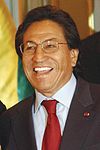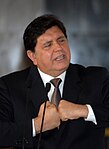The politics of the Republic of Peru takes place in a framework of a unitary semi-presidential representative democratic republic, whereby the President of Peru is both head of state and head of government, and of a pluriform multi-party system. Executive power is exercised by the President and the Government. Legislative power is vested in both the Government and the Congress. The Judiciary is independent of the executive and the legislature. The Economist Intelligence Unit rated Peru a "hybrid regime" in 2022.

Cambio 90 was a Peruvian right-wing political party which entered the political spectrum in early 1990, and throughout the 1990s until late-2000 was the most powerful political party in Peru alongside New Majority, serving more as an instrumental electoral vehicle for Alberto Fujimori.

Luis Juan Alva Castro is a Peruvian economist and politician. In his political career, he achieved the government positions of Second Vice President of Peru, Prime Minister of Peru, President of the Congress and among other portfolios during both administrations of President Alan García.

Vladimiro Lenin Ilich Montesinos Torres is a Peruvian former intelligence officer and lawyer, most notorious for his role as the head of Peru's National Intelligence Service (SIN) during the presidency of Alberto Fujimori. Montesinos was widely regarded as the power behind the throne, often regarded as the true authority in the government, supported by the Peruvian Armed Forces.
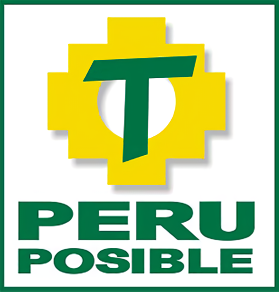
Possible Peru was a Peruvian political party. It was founded in 1994 by Alejandro Toledo with the original name of Possible Country.
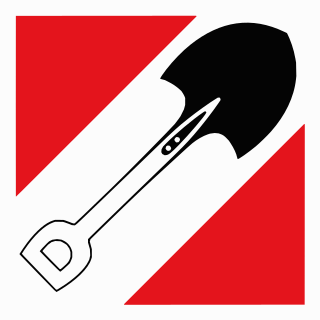
The Popular Action is a liberal and reformist political party in Peru, founded by former Peruvian president Fernando Belaúnde.

Union for Peru is a Peruvian political party founded by Javier Pérez de Cuéllar, an ex-UN Secretary General, in 1994 to run for the presidency of Peru in the 1995 general elections. Originally a social democratic party, the party became the main political home of the Peruvian ethnocacerist movement in the late-2010s after a group led by former Army Major Antauro Humala joined the party. Humala later formed the Patriotic Front in 2018 and contested the 2021 general elections.

Valentín Toribio Demetrio Agustin Paniagua Corazao was a Peruvian lawyer and politician who briefly served as 55th President of Peru from 2000 to 2001. Elected President of Congress on 16 November 2000, he ascended to the presidency as incumbent Alberto Fujimori and both his Vice Presidents resigned by 22 November 2000.

Lourdes Celmira Rosario Flores Nano is a Peruvian lawyer and politician who served as a councilwoman of Lima, Deputy from Lima from 1990 to 1992, Democratic Constituent Congresswoman from 1992 to 1995, Congresswoman from 1995 to 2000, and the Christian People's Party candidate for President of Peru in the 2001 and 2006 elections in which she ran under the National Unity.
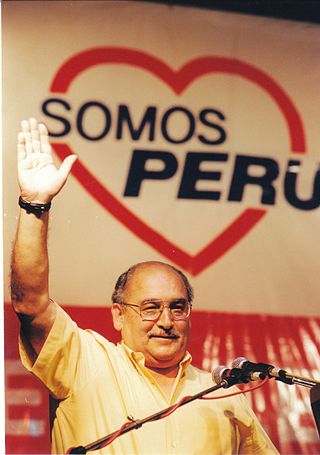
Alberto Manuel Andrade Carmona was a Peruvian lawyer and politician, born in Lima who served as the Mayor of Lima from 1996 to 2002 and as a Congressman from 2006 until his death.
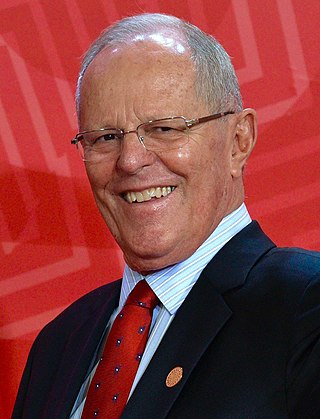
Pedro Pablo Kuczynski Godard, also known simply as PPK, is a Peruvian economist, public administrator, and former politician who served as the 59th President of Peru from 2016 to 2018. He served as Prime Minister of Peru and as Minister of Economy and Finance during the presidency of Alejandro Toledo. Kuczynski resigned from the presidency on 23 March 2018, following a successful impeachment vote and days before a probable conviction vote. Since 10 April 2019 he has been in pretrial detention, due to an ongoing investigation on corruption, money laundering, and connections to Odebrecht, a public works company accused of paying bribes.
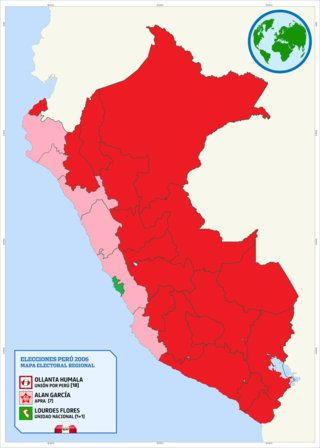
General elections were held in Peru in on 9 April 2006 to elect the President, two Vice-Presidents, 120 members of Congress and five members of the Andean Parliament for the 2006–2011 period. As the no presidential candidate received a majority of the vote, a second round was held on 4 June between the top two candidates, Ollanta Humala and Alan García. Garcia won the run-off with 52.63% to Humala's 47.37%. He was subsequently inaugurated on 28 July 2006, Peruvian Independence Day.

Martha Gladys Chávez Cossío de Ocampo is a Peruvian Fujimorist politician and lawyer. A historical and a prominent figure of Fujimorism, she has served in Congress for six non-consecutive terms from 1995 to 2006 and from 2011 to 2016, and since 2020 to finish the 2016–2021 term that was interrupted by the dissolution of Congress. In the 2006 elections, she ran for the presidency, running on the Fujimorist Alliance for the Future ticket, but she lost, placing fourth in the election.
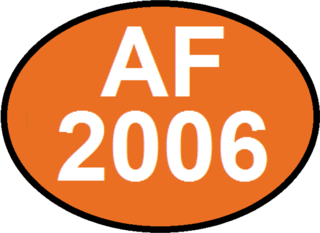
Alliance for the Future was a Peruvian electoral alliance formed by pro-Fujimori parties Cambio 90, New Majority Siempre Unidos and Sí Cumple for the 2006 general election. Its presidential candidate was former President of the Congress and Congresswoman Martha Chávez Cossio.

General elections were held in Peru on 9 April 2000, with a run-off of the presidential election on 28 May. The elections were highly controversial and widely considered to have been fraudulent. Incumbent President Alberto Fujimori was re-elected for a third term with almost three-quarters of the vote. However, the elections were tainted with allegations of unconstitutionality, bribery, structural bias, and outright electoral fraud. Alejandro Toledo boycotted the second round of the presidential election, in which over 30% of ballots were declared invalid. Fujimori subsequently called for new elections after his scandal, fled Peru, and faxed in his resignation from a hotel in Japan.

Ollanta Moisés Humala Tasso is a Peruvian politician and former military officer who served as President of Peru from 2011 to 2016. Originally a socialist and left-wing nationalist, he is considered to have shifted towards neoliberalism and the political centre during his presidency.
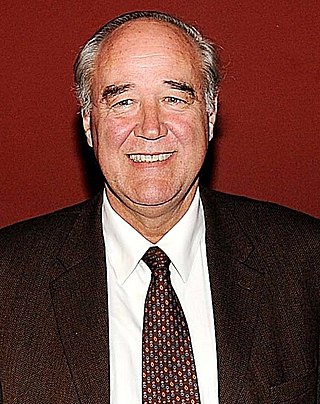
Víctor Andrés García Belaúnde, is a Peruvian lawyer and politician belonging to the Popular Action and a former Congressman representing Lima between 2006 and 2019. He was president of the Popular Action from 2004 to 2009.

General elections were held in Peru on 10 April 2016 to determine the president, vice-presidents, composition of the Congress of the Republic of Peru and the Peruvian representatives of the Andean Parliament.

General elections were held in Peru on 8 April 1990, with a second round of the presidential elections on 10 June. This exercise was to elect the President of the Republic, two vice presidents, and the members of Congress. The elections filled 180 seats in the Chamber of Deputies and 60 seats in the Senate for the 1990-1995 governmental period.

Peruvians for Change was a centre-right party in Peru.

